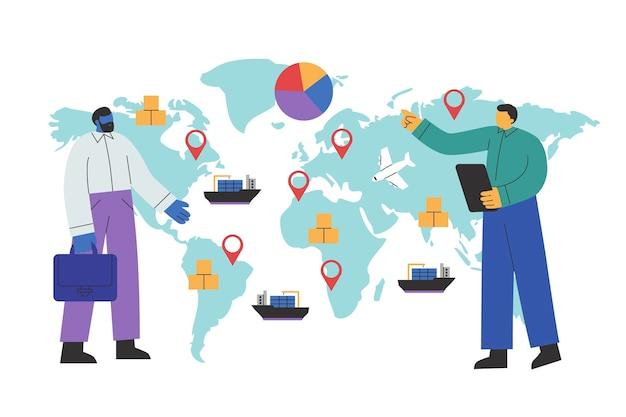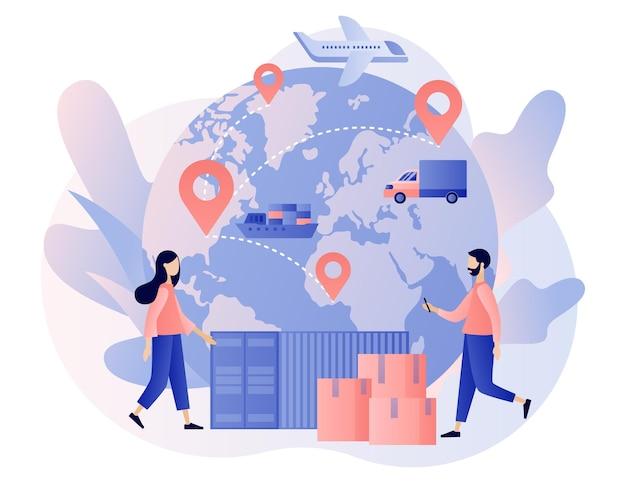As we enter the year 2023, the world continues to shrink in many ways, thanks to the ongoing phenomenon of globalization. Whether it’s the ease of communication and transportation or the interconnectedness of economies, globalization has become an integral part of our daily lives. But have you ever wondered what factors are behind this global transformation? In this blog post, we will delve deep into the factors affecting globalization and shed light on how they shape our world.
Globalization encompasses various aspects, from trade and investment to culture and technology. To understand its complexities, we need to explore the economic, social, and political factors that drive this transformative process. From advancements in technology that enable instant communication across borders to the liberalization of trade policies, each factor plays a crucial role in fostering globalization’s growth.
In this article, we will examine the three primary factors affecting globalization and discuss their impact on different aspects of our lives. So, whether you’re curious about the economic problems that fuel this global phenomenon, want to gain insight into the relationship between poverty and globalization, or seek a comprehensive understanding of globalization’s driving forces, you’ve come to the right place. Let’s dive in and discover the factors shaping our interconnected world!

What Factors Influence Globalization
Economic Forces: The Driving Engine of Globalization
Globalization is a freight train that’s fueled by a myriad of factors, and economic forces hold the coveted position of the locomotive. As the world becomes increasingly interconnected, countries engage in global trade, creating a web of economic interdependencies. Economic factors, such as trade liberalization, advancements in transportation and communication technology, and multinational corporations, play a vital role in propelling the train of globalization forward.
Trade Liberalization: Breaking Down Barriers
To understand the impact of trade liberalization on globalization, imagine a world where countries closed their borders tighter than a jar of pickles. Thankfully, that’s not the reality we live in, as many countries now promote free trade and have loosened restrictions on imports and exports. This openness fosters international cooperation, boosts economic growth, and deepens global integration, effortlessly connecting people and businesses across borders.
Technological Innovations: Shrinking Our Vast Planet
Ah, yes, technology—the wizardry that keeps us glued to our screens! Technological advancements have shrunk our once vast planet into a mere global village. The internet, through its interconnectedness and lightning-fast communication, has paved the way for instant global communication, enabling businesses to collaborate, trade, and outsource across borders effortlessly. Remember when a snail mail took weeks? Now a Zoom call can bring continents together in seconds.
Multinational Corporations: Giants Roaming the Globe
Imagine Goliath-sized corporations spreading their wings and soaring across the globe. Multinational corporations (MNCs) are instrumental in globalization, as they establish a presence in multiple countries, fueling cross-border trade, investment, and even cultural exchange. These global giants capitalize on economies of scale, leverage diverse markets, and navigate international business landscapes with relative ease.
Political Forces: The Puppet Masters of Globalization
Beyond the economic realm, political forces exert significant control over the strings of globalization. Political decisions and policies shape the international landscape, influencing the direction and pace of global integration. Let’s take a closer look at the political factors underpinning globalization.
Government Policies: Setting the Stage
Governments hold immense power in shaping globalization through their policies. Whether it’s opening up borders, negotiating free trade agreements, or implementing favorable tax regimes, government decisions can either facilitate or hinder the flow of goods, services, and investments across borders. The right policies can smooth the path towards global interconnectedness, while the wrong ones can throw a wrench in the gears of globalization.
International Organizations: The Superheroes of Global Cooperation
Behold the mighty superheroes of globalization—international organizations! Organizations like the United Nations, World Trade Organization, and International Monetary Fund promote global cooperation, facilitating dialogue, negotiation, and consensus-building among countries. Through their efforts, international organizations help ensure a level playing field for all countries, addressing issues such as trade disputes, human rights, and sustainable development.
Geopolitical Dynamics: Changing the Global Chessboard
Picture a game of chess played by global powers. Geopolitical dynamics, such as shifting alliances, territorial disputes, and ideological conflicts, can impact the course of globalization. When countries engage in political tussles or face security threats, it can leave a mark on global trade, investment, and cooperation. Just like the rook and bishop strategically maneuver on the chessboard, geopolitical forces shape the landscape of an interconnected world.
Socio-Cultural Factors: The Colorful Mosaic of Globalization
Globalization is not just about economic and political forces; it also reflects the vibrant tapestry of diverse cultures, values, and ideologies. Socio-cultural factors add depth and richness to the globalizing world, influencing the way societies interact, integrate, and adapt.
Cultural Exchange: The Spices of Globalization
In this global melting pot, cultural exchange spices things up by bringing diverse flavors to the mix. The exchange of ideas, traditions, and artistic expressions helps break down cultural barriers, fostering mutual understanding and appreciation. Whether it’s through music, cuisine, or fashion trends, cultural exchange injects vibrancy into the veins of globalization.
Migration: People on the Move
As people roam the globe in search of better opportunities, migration acts as a catalyst for globalization. When individuals move from one country to another, they bring along their unique experiences, skills, and perspectives. This global movement of people shapes labor markets, encourages knowledge exchange, and contributes to the dynamism of societies around the world.
Social Media: The Global Town Square
In this hyperconnected age, social media acts as the global town square, bringing people from all corners of the world together at the click of a button. Platforms like Facebook, Twitter, and Instagram transcend borders, serving as catalysts for communication, cultural exchange, and grassroots activism. With the power to shape public opinion and mobilize global movements, social media has become an influential force propelling globalization forward.
In conclusion, globalization is a multifaceted phenomenon influenced by economic, political, and socio-cultural forces. Economic factors provide the fuel, political forces steer the direction, and socio-cultural factors add color and diversity to the tapestry of globalization. As the world continues to evolve and interconnect, understanding and navigating these factors becomes crucial for individuals, businesses, and nations alike. Embrace the ride, for globalization is here to stay, whisking us towards an ever more interconnected future.

FAQ: Factors Affecting Globalization
What are the 3 Economic Problems
Economic problems are like those pesky obstacles on the road to a thriving global economy. Here are three that often cause a bit of a headache:
1. Inflation: When Money Goes Wild
Ah, inflation, the sneaky little devil that causes prices to rise faster than an overinflated balloon. It’s like trying to catch a greased pig at a county fair—almost impossible. When inflation runs amok, the value of money plummets, leaving us feeling a little lighter in the wallet. So, keep an eye on those prices, folks!
2. Unemployment: Job Seekers Unite!
Unemployment can be a real party pooper. It’s like showing up to a dance but finding no one willing to jive with you on the dance floor. When people don’t have jobs, they can’t earn money, which leads to a whole cascade of problems. So, let’s all join hands and hope for a world where everyone has a chance to cha-cha their way to a fulfilling career!
3. Income Inequality: The Great Divide
We’re all in this together, right? Well, income inequality begs to differ. It’s like that one kid who hogs all the cake at a birthday party, leaving others with mere crumbs. When there is a massive gap between the haves and the have-nots, it creates social tension and stifles the path to economic success. Let’s spread the cake love around a bit, shall we?
What is Poverty Paragraph
Ah, poverty, the unwelcome guest that just won’t leave the global economy’s house party. Picture this: poverty is like wearing socks with sandals—an uncomfortable combination. It refers to a state where individuals or communities lack the basic necessities of life, such as shelter, food, and access to education and healthcare. It’s time to kick poverty out and invite prosperity and equality to be the life of the party!
What are the Factors Affecting Globalization
Globalization, my friend, is like an unstoppable wave that is shaping the world as we know it. But what factors ride on this wave? Let’s take a thrilling plunge into the deep end of the globalization pool and explore the key factors:
1. Technological Advancements: Hello, Digital Age!
In this crazy digital age, technology is the lifeblood of globalization. It shrinks the world, connects people across borders, and enables the transfer of goods, services, and ideas at the speed of light. From the invention of the internet to smartphones that put the world in our pockets, technological advancements have revolutionized globalization like never before.
2. Trade Liberalization: Open Sesame!
Trade, oh trade, you magical genie of commerce! Trade liberalization is like opening the doors to a treasure trove of economic growth. By removing barriers like tariffs and quotas, countries can freely exchange goods and services, boosting their economies and creating a win-win situation. So, let’s wave that wand of free trade and watch the magic happen!
3. Cultural Exchange: Spice Up Life!
Imagine life without tacos, sushi, or pizza. Bland, right? Well, that’s the power of cultural exchange in globalization. When people from different cultures interact, share ideas, and savor each other’s delicacies, it adds some serious flavor to the world. Let’s keep celebrating our differences and learn from one another, making our global village a more culturally vibrant and exciting place to be!
And there you have it, my friend! These are just a few of the factors that influence globalization and shape our interconnected world. So, let’s continue riding the globalization wave, embracing the challenges and opportunities it brings. Who knows what exciting adventures await us in the ever-evolving landscape of our globalized planet!
